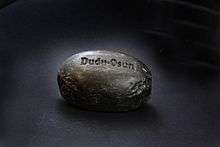African black soap

African black soap or black soap (also various local names such as sabulun salo, ose dudu and ncha nkota) is a kind of soap originating in West Africa. It is made from the ash of locally harvested African plants, which gives the soap its characteristic dark color.[1][2] Black soap has become a popular toiletry product in North America.[3]
In West Africa, and especially Ghana, black soap is often made by women and fair-traded. The women use secret family or community recipes that have been handed down for generations. First they sun-dry the plant matter, such as plantain skins, palm tree leaves, cocoa pods, and shea tree bark, and burn it to ash. Next they add water and various oils and fats, such as coconut oil, palm oil, and shea butter, cook the mixture until it solidifies, and hand-stir it for at least 24 hours. They then scoop out the soap and let it "cure".[4][5]
A variety of black soap known as ose-dudu originated with the Yoruba people of Nigeria. A combination of ose-dudu with leaves of the tropical camwood tree (Pterocarpus osun) produces a popular kind of soap with exfoliating properties called dudu-osun.[3]
Black soap has been found to have some antifungal properties[6][7][8] against skin microbiota such as Staphylococcus aureus, Escherichia coli and Candida albicans.
Moroccan black soap is the Syrian version of black soap with essential oil. "The basic recipe remained the same in both countries. It was improved by adding fragrances of essential oils that are included in the traditional hammam ritual".[9]
References
- ↑ Underwood, Kristin (September 4, 2008). "What is Black Soap?". TreeHugger.
- ↑ Barker, Elizabeth (July 1, 2014). "Black Soap, Bright Skin". Vegetarian Times.
- 1 2 Aguh, Crystal; Okoye, Ginette (2016). Fundamentals of Ethnic Hair: The Dermatologist's Perspective. Springer. pp. 139, 151. ISBN 978-3-31-945695-9.
- ↑ Nelson, Jennifer (September 3, 2015). "What is African Black Soap?". Mother Nature Network.
- ↑ Strausfogel, Sherrie (May 1, 2015). "African Black Soap". Better Nutrition.
- ↑ Samaila AB, Yarma AA and Oshomoh EO. Anti-fungal and Anti-bacterial activities of Sabulun salo local soap in Bauchi Metropolis, Bauchi State, Nigeria. Special Fungal Pathogens Journal (SFPJ), Vol 1, No 1, pg: 0014-0018
- ↑ Aliyu, M. S.; Tijjani, M. B.; Doko, M. H. I.; Garba, I.; Ibrahim, M. M.; Abdulkadir, S. M.; Abba, D.; Zango, U. U. (2012-01-01). "Antimicrobial Activity of Sabulun Salo a Local Traditional Medicated Soap". Nigerian Journal of Basic and Applied Sciences. 20 (1): 35–38. ISSN 0794-5698.
- ↑ S, Ikpoh I.; A, Lennox J.; E, Agbo B.; S, Udoekong N.; A, Ekpo I.; O, Iyam S. (2017-03-31). "Comparative studies on the effect of locally made black soap and conventional medicated soaps on isolated human skin microflora". Journal of Microbiology and Biotechnology Research. 2 (4): 533–537. ISSN 2231-3168.
- ↑ "How to Use Black Soap | Moroccan Hammam Natural Beauty Care". Moroccan Hammam. Retrieved 2016-11-15.